
Published: March, 1963
Script: Stan Lee
Art: Steve Ditko
Letters: John Duffy
“Spider-Man vs. the Chameleon!”
Script: Stan Lee
Art: Steve Ditko
Letters: John Duffy
POWER OF THE PRESS
As I continue to perfect the art of the concise synopsis, here’s the action from our first story, in a nutshell:
To help Aunt May pay the bills, Peter Parker makes an encore performance as Spider-Man, which is a big hit with the public, but not with J. Jonah Jameson, publisher of the Daily Bugle. Even when Spidey saves a meandering space capsule piloted by Jameson’s son, Jameson is unappreciative and continues to call for Spider-Man’s arrest. Frustrated, and with public opinion now firmly against him, Peter wonders if a life of crime might be his only option.
Okay, that might be a bit too concise. Of course there’s a lot more going on in this story, but when you boil it down, I come up with one overwhelmingly pressing question. You’ll have to “pardon my French,” but, here it is: what the hell is up Jameson’s ass?
JAMESON
I mean…really! You would think after seeing Spider-Man singlehandedly save his son’s life, he would be grateful. But Noooo! Instead, Jameson twists everything around and puts out the theory that Spider-Man himself sabotaged the capsule specifically so he could perform the rescue and be hailed as a hero.
Oooo…kaaaaay…And your supporting evidence is…?
You know, Jameson sounds like one of those conspiracy theorists, always looking for the worst in everyone. And if he wants to be that way, I guess he has the right. But it’s not right when the publisher of the most powerful newspaper in town uses his power to propagate outrageous theories  without even one shred of supporting evidence. What school of journalism did Jameson attend? Does he not know the difference between “fact” and “opinion”? Does he not know…or does he simply not care? Or maybe he just hopes his readers don’t know and don’t care.
without even one shred of supporting evidence. What school of journalism did Jameson attend? Does he not know the difference between “fact” and “opinion”? Does he not know…or does he simply not care? Or maybe he just hopes his readers don’t know and don’t care.
What we have here is a massive abuse of power. In this story, Stan notes that “if something is shouted loud enough, there are always those who will believe it.” This is the power of the press. In one of my recent posts about the Hulk, I noted that the press trusts the military for accurate information, and here the public trusts the press to relay information accurately. I know it’s the 1960’s, a different social climate, but I’m disappointed in the general public for latching on so easily to what they read in the newspaper, accepting it as “fact” when it’s clearly nothing more than opinion.
Did schools not teach critical thinking skills back in the 1960’s?
Spider-Man starts out well-liked in this story, if only as a circus performer. And he could have been well-liked as a hero, if Jameson hadn’t immediately twisted everything around, spewing bile about his good deeds. Peter Parker’s heart is obviously in the right place, and Spider-Man has the opportunity to do some good in the world, but Jameson puts an end to that.
Why?
Okay, here are my theories about Jameson.
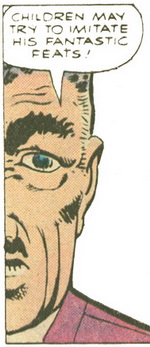 1. Power corrupts, absolute power corrupts absolutely. As the publisher of the powerful Daily Bugle, Jameson is drunk with power. Realizing that he is in a position to go way beyond simply reporting the news, that he can shape public opinion, he exercises that power every chance he gets, whether it’s right or not, whether it makes sense or not. He wields his power, simply because he can, simply because he enjoys being powerful.
1. Power corrupts, absolute power corrupts absolutely. As the publisher of the powerful Daily Bugle, Jameson is drunk with power. Realizing that he is in a position to go way beyond simply reporting the news, that he can shape public opinion, he exercises that power every chance he gets, whether it’s right or not, whether it makes sense or not. He wields his power, simply because he can, simply because he enjoys being powerful.
2. Perhaps in addition to all this, Jameson sees someone like Spider-Man, with supernatural strength and abilities, as a threat to his own power. He fears a time when Spider-Man might command more respect than he does, so he shoots first, cutting off his “opponent” at the knees. Jameson is a bully who builds himself up by cutting other people down.
3. Same as above, only with the love of a father, Jameson is primarily invested in securing a place in history for his son. He idolizes his son, John Jameson the test pilot, as a true American hero, and doesn’t want him to have to share the spotlight with any other heroes, so he immediately labels them as “selfish freaks” and “masked menaces.”
4. Jameson is a hateful bigot. He fears what he doesn’t understand, and since he doesn’t understand Spider-Man, he makes the gut-level decision to strike him down, as he would anyone that doesn’t fit into his narrowly defined view of what is normal and acceptable.
5. Jameson is not interested in heroes at all. He’s simply interested in selling newspapers, and he’s aware that if he can portray this mysterious new figure as a horrible criminal, he can raise the ire of the unsuspecting public and sell lots and lots of newspapers.
As we get to know Jameson, other possibilities may spring up. But for right now, I’m enraged by his behavior towards Spider-Man, and I don’t like him very much. In fact, my initial reaction upon meeting J. Jonah Jameson was to immediately slap his face onto my Villain Valuation chart…but then, when I shared these feelings with Russ, he asked me a very pointed question:
What is the criteria for a villain?
When I gathered my emotions and thought about it, I realized that though Jameson is aggravating and unethical, and even though he’s in opposition to our hero Spider-Man, these traits alone don’t qualify him for Villainhood.
In our conversation, Russ introduced the word “antagonist,” and that’s actually the best way to describe Jameson at this point. He’s not actively trying to perpetuate evil, he’s merely trying to discredit and hinder a hero from doing good. He’s antagonizing  Spider-Man, causing the poor kid no end of trouble. We don’t know enough about Jameson yet to know his true motives. I’m sure in future stories we’ll get a clearer picture of just what he’s up to, what makes him tick. But for the moment, I guess I’ll have to give him the benefit of the doubt—innocent until proven guilty. That is, of course, a lot more than Jameson is giving Spider-Man at this point! But then, I have a unique perspective on Spider-Man which J. Jonah Jameson does not enjoy.
Spider-Man, causing the poor kid no end of trouble. We don’t know enough about Jameson yet to know his true motives. I’m sure in future stories we’ll get a clearer picture of just what he’s up to, what makes him tick. But for the moment, I guess I’ll have to give him the benefit of the doubt—innocent until proven guilty. That is, of course, a lot more than Jameson is giving Spider-Man at this point! But then, I have a unique perspective on Spider-Man which J. Jonah Jameson does not enjoy.
Russ assures me that Jameson will develop over time into one of the more complex and interesting supporting characters in the Marvel Universe. I look forward to seeing that, but until I see something radically different from Jameson, I’ll be sleeping with one eye open.
INCIDENTALLY…
For me, the main focus of this story is the introduction of J. Jonah Jameson, and the trouble he causes for Peter, who just wants to do right by poor old Aunt May. But there are a few other things that grabbed my attention, made me wonder and chuckle, so let me share these before we move on to the second story.
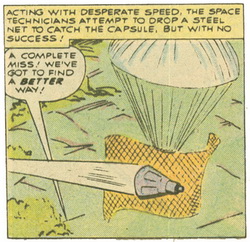 • There’s a cute bit where Spider-Man gets paid for his show by check, but of course he can’t cash the check because he doesn’t have a social security card or a bank account in the name of “Spider-Man”! Having a secret identity can be a bummer, causing all kinds of logistical problems. I don’t think the FF ever had to deal with this!
• There’s a cute bit where Spider-Man gets paid for his show by check, but of course he can’t cash the check because he doesn’t have a social security card or a bank account in the name of “Spider-Man”! Having a secret identity can be a bummer, causing all kinds of logistical problems. I don’t think the FF ever had to deal with this!
• Peter Parker has some very real problems. He’s not a renowned scientist like Bruce Banner or Henry Pym, and he doesn’t have an unlimited supply of fabulous resources at his command, like the Fantastic Four. He’s a high school kid who gets teased by his classmates and has to take a part-time job, so he and his aunt can pay the rent. These are real problems, faced by real people.
• The attempt to drop a steel net to catch the catapulting capsule is highly amusing. Page 8 bottom left Sometimes in these stories, we think, “Yeah…this could happen in real life.” Other times: “This could only happen in comic books.”
• All the action takes place in New York City. Yet, “having nothing better to do,” Peter goes out to see the rocket launch. Where? And how did he get there? Unless we’re now launching rockets from Times Square??
And finally…
• In the half-page rehash of the origin story, Peter says that after Uncle Ben’s death, he was “lusting for vengeance.” I don’t care how upset he is, no teenager uses the word “lusting,” and especially not in regard to vengeance.
Okay! That wraps up the first story! Let’s move on to the second.
SYNOPSIS
 Peter Parker decides he can make money by joining the Fantastic Four, so he breaks into FF HQ, but the Four are not impressed with his antics. Spidey goes away mad.
Peter Parker decides he can make money by joining the Fantastic Four, so he breaks into FF HQ, but the Four are not impressed with his antics. Spidey goes away mad.
Disguised as Spider-Man, the Chameleon steals missile defense plans he hopes to sell to the Commies. Having lured Spider-Man to the rooftop with a promise of something “very profitable,” the Chameleon escapes in a helicopter moments before Spidey arrives. Realizing he’s been framed, Spidey evades the guards, pursues the helicopter, and captures the Chameleon.
However, before the Chameleon can be taken into custody, he escapes, disguises himself as a police officer, and once again attempts to frame the real Spider-Man. During a scuffle, the Chameleon’s disguise is torn, revealing him as the real criminal. Spider-Man gets away, sobbing that nothing ever goes right, and wishing he’d never gotten his super-powers.
SPIDEY AND THE FF
I’m starting to notice a pattern in many of these comics: we start off with a sub-plot that, while usually amusing, is incidental to the main action. Still, this sub-plot often contains important information that advances the arc storyline. It only took me two short sentences to synopsize the sub-plot regarding Spider-Man’s meeting with the Fantastic Four, but for my money, this is the more interesting story.
In this sub-plot, Peter decides to interview for the Fantastic Four, even though there’s no job opening. He figures the Four will be so blown away by his powers they’ll have no choice but to invite him in with open arms. Ah, the ego and enthusiasm of youth! Of course…how wrong he is!
Wrong on so many levels, actually. First, he makes this huge assumption (and you know what happens when you ASSume…right?) that being a member of the FF is a paying position. Next, he erroneously concludes that the Four will be so  impressed (in fact, “twice as impressed”) with his ability to break into their headquarters, they will have no choice but to grant him membership in their exclusive club.
impressed (in fact, “twice as impressed”) with his ability to break into their headquarters, they will have no choice but to grant him membership in their exclusive club.
That’s not the way it goes at all. In fact, the first meeting of Spider-Man and the Fantastic Four goes badly, very badly indeed. But it didn’t have to. Sure, lots of terrible things have happened to Peter Parker since we’ve met him. Some are his fault (stepping aside for the robber who eventually kills Uncle Ben), and others are not (Jameson taking an instant and intense dislike to his Spider-Man persona). But this one is all Peter’s fault, 100% in the “What was he thinking?” column.
When the FF realize it’s Spider-Man breaking into their building, they immediately ask, “Why didn’t he phone for an appointment, like anyone else?” And Thing has the spot-on answer: “’Cause he’s a teenager cornball show-off.” Now, I’m not really sure what a “cornball” was, back in the 1960’s, but the “show-off” remark rings true.
I haven’t read a lot of Spider-Man stories yet, but from the few I have, and from the movies, I know that Spider-Man likes to engage in cocky verbal combat while sparring with his enemy. He shouldn’t have treated the FF as his enemy in this scene, but he starts with “Greetings, group! You shouldn’t make it so easy for people to drop in on ya!” In other words: “You bunch of morons, see how quickly I’ve overcome your obstacles!” Well, Thing responds immediately by calling him “Loud-Mouth,” then Spidey returns with “Gruesome,” and from there we go to “Rubber-Face,” “You Big Ape,” and “You Animated Insect!” Not getting off on the right foot, are we?
Spidey tangles with each member of the FF, just for the fun of it, I think. Not his fun or their fun, but ours. I wonder if Stan and Steve (Ditko) sat around thinking, “So if this one were to fight that one…what would happen?” They put on their thinking caps, and we reap the benefits.
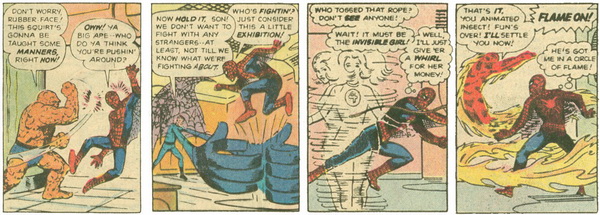
Spider-Man feels he’s been insulted by the FF and leaves, saying, “I’ll make you guys look like pikers!” Well, I have to admit, I had no idea what a “piker” is and had to look it up. A piker is “a person who does anything in a contemptibly small or cheap way.” Okay…pretty good insult there. And since I learned something new, this word is going on my Wacky and Wonderful Words vocabulary page.
VILLAIN
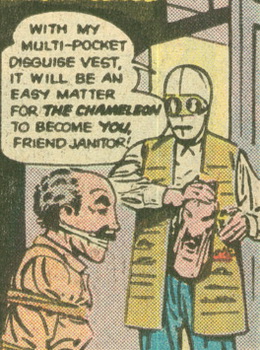 One: He wears a vest of many pockets, in which he stores items that allow him to assume a multitude of disguises. Now, disguising yourself is not a super-power; however, concealing all that stuff within the pockets of a single vest? You’ve got to admit, that’s pretty amazing. The Chameleon himself may not have super-powers, but does his vest? The Puppet-Master sculpted realistic figures, but his medium was a radioactive clay with supernatural qualities. Dare I say…magical? Is that what’s going on with the Chameleon’s vest? Is it magical? If deprived of his vest, could the Chameleon still wreak havoc?
One: He wears a vest of many pockets, in which he stores items that allow him to assume a multitude of disguises. Now, disguising yourself is not a super-power; however, concealing all that stuff within the pockets of a single vest? You’ve got to admit, that’s pretty amazing. The Chameleon himself may not have super-powers, but does his vest? The Puppet-Master sculpted realistic figures, but his medium was a radioactive clay with supernatural qualities. Dare I say…magical? Is that what’s going on with the Chameleon’s vest? Is it magical? If deprived of his vest, could the Chameleon still wreak havoc?
But the Chameleon does have another trick up his sleeve. Two: Apparently he has a device which allows him to send messages in “spider frequency.” Neat trick. Which Russ tells me we’ll probably never see again. I think Stan was borrowing an idea from his Ant-Man stories, but in fact, spiders don’t communicate on a “frequency.”
Anyway…three: The Chameleon is also able to produce an artificial web that, while not as effective as Spider-Man’s web, is at least able to hold a victim at bay for a short time. Having these capabilities, I guess the Chameleon must be some kind of scientist.
And what is it that the Chameleon aspires to do, with all his knowledge and power? He seeks personal monetary gain by selling state secrets to the Commies. Oh, c’mon! Really? Another one of those “I’ll sell secrets to the Commies” villains? Well, actually, I guess that is pretty villainous. In the 1960’s, anyone who would betray their country to the Commies was lower than dirt. Actually, even today, that’s still considered lower than dirt. But in the 1960’s, “I’ll sell secrets to the Commies” was comic book shorthand for “Worst Possible Kind of Villain.”
Ethics and loyalties aside, I have questions about the Chameleon’s intelligence. He uses his intellect to surmise that there’s “only one reason Spider-Man would want to join the Fantastic Four! Being sought by the police, there is no way for him to earn a legitimate living! He must be desperate for money!” And based on that presumption, he formulates his plan.
But let’s look at that statement for a moment.
First: Only one reason? For money? Can we really assume that? (Remember, once again, what happens when we ASSume…) Maybe the Chameleon only does things for money, but that doesn’t mean that everyone else is similarly motivated. Does the Chameleon not consider that perhaps Spider-Man seeks to do good, and has decided that joining forces with the FF will increase his productivity as he fights evil? Is he so evil that he cannot even begin to imagine someone being altruistically motivated?
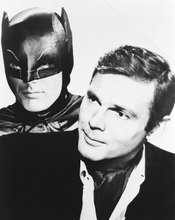 Next: There’s no way for him to earn a legitimate living? Does the Chameleon not realize that when Spider-Man takes off his outfit, he’s a normal human being? And does he not even consider the possibility that the person under that suit might have other ways of earning a decent living? I mean, what if the person under that suit is Bruce Wayne?
Next: There’s no way for him to earn a legitimate living? Does the Chameleon not realize that when Spider-Man takes off his outfit, he’s a normal human being? And does he not even consider the possibility that the person under that suit might have other ways of earning a decent living? I mean, what if the person under that suit is Bruce Wayne?
Finally: The Chameleon assumes that Spider-Man must be desperate for money. Refer to my recent rhetorical question about Bruce Wayne. Again, I say: There’s no way for the Chameleon to logically assume that Spider-Man does anything he does solely for cash.
Of course, the happy accident in all this (happy for the Chameleon, anyway) is that he happens to be right about Spider-Man. His suppositions may be flawed in logic, but it doesn’t matter, because he comes to the correct conclusion, and formulates his plan based on these assumptions.
I think he just got lucky on that one, though, because later, he makes a huge blunder that leads to his downfall. When at last he is captured by Spider-Man, the Chameleon yells, “Help! Grab him! It’s the Chameleon disguised as Spider-Man again!”
 Okay. Is this is the equivalent of showing all your cards before you place your bet? Up till now, the only thing the cops knew was that Spider-Man claimed someone had “impersonated” him. They also heard him say, “Nobody’s framin’ me for anything!” But Spider-Man’s name has been smeared in the press, his reputation tarnished by the fanatical rantings of J. Jonah Jameson. The cops would be likely to discredit anything Spider-Man says. And the cherry on top: at this point, there is no actual proof of any imposter.
Okay. Is this is the equivalent of showing all your cards before you place your bet? Up till now, the only thing the cops knew was that Spider-Man claimed someone had “impersonated” him. They also heard him say, “Nobody’s framin’ me for anything!” But Spider-Man’s name has been smeared in the press, his reputation tarnished by the fanatical rantings of J. Jonah Jameson. The cops would be likely to discredit anything Spider-Man says. And the cherry on top: at this point, there is no actual proof of any imposter.
So, Chameleon helps the cops by revealing that there is indeed an impostor…and he even provides the name of the culprit: The Chameleon!
Does Marvel have a Hall of Stupid Criminals? If they don’t, they should. And I nominate the Chameleon as a card-carrying charter member.
NOT THERE YET…
The Spider-Man series is still in its infancy, and in this issue we see some staples of the mythos taking shape, but we’re not there yet. In this story, Spider-Man says, “My spider instinct senses danger,” and later “That tingle I feel!” But we haven’t put those elements together yet for the famous “My spider-sense is tingling!”
Also, on several occasions, he is called “the” Spider-Man. I still have trouble now and then knowing when to include the “The” in the title of a villain or hero. Sometimes you can go either way, as in “Hulk,” or “The Hulk.” But I’m pretty sure nobody today says “the Spider-Man.”
CONCLUSION – THE PLIGHT OF THE SPIDER-MAN
 However, this story does one thing very well: it moves along the plight of poor Peter Parker, the much-maligned and misunderstood hero. In the previous story, Jameson publically discredits Spider-Man, and here the Chameleon incorporates that public disgracing into his evil schemes by using Spider-Man as the “fall guy.” Elements build on elements, the plot thickens, the web expands.
However, this story does one thing very well: it moves along the plight of poor Peter Parker, the much-maligned and misunderstood hero. In the previous story, Jameson publically discredits Spider-Man, and here the Chameleon incorporates that public disgracing into his evil schemes by using Spider-Man as the “fall guy.” Elements build on elements, the plot thickens, the web expands.
And Peter is left sobbing, “Nothing turns out right…SOB…I wish I had never gotten my superpowers!” We end our tale with the Fantastic Four wondering if the Spider-Man might turn against the law.
Of course we know better, but the comic readers of the day might have shared the doubts of the FF. One thing I feel for sure, anyone reading Amazing Spider-Man #1 was certain to save up their 12 cents for Amazing Spider-Man #2, anxious to see what further ills might befall young Peter Parker as he struggles between the desire to do right by his elderly aunt, and the frustration of slander visited upon his alter-ego…the Spider-Man!
![]() This time, a sub-plot involved Spidey and the FF, but next time, the crossover is more integral to the action. If you, like Rick Jones here, find yourself wondering, “Hmmm…who’s going to meet up with whom?” then join me next time in the Marvelous Zone, for a cross-country clash of titans!
This time, a sub-plot involved Spidey and the FF, but next time, the crossover is more integral to the action. If you, like Rick Jones here, find yourself wondering, “Hmmm…who’s going to meet up with whom?” then join me next time in the Marvelous Zone, for a cross-country clash of titans!
| Want to read this comic on your computer? Marvel has a scan! Want to own this story? Buy the Masterworks! |














